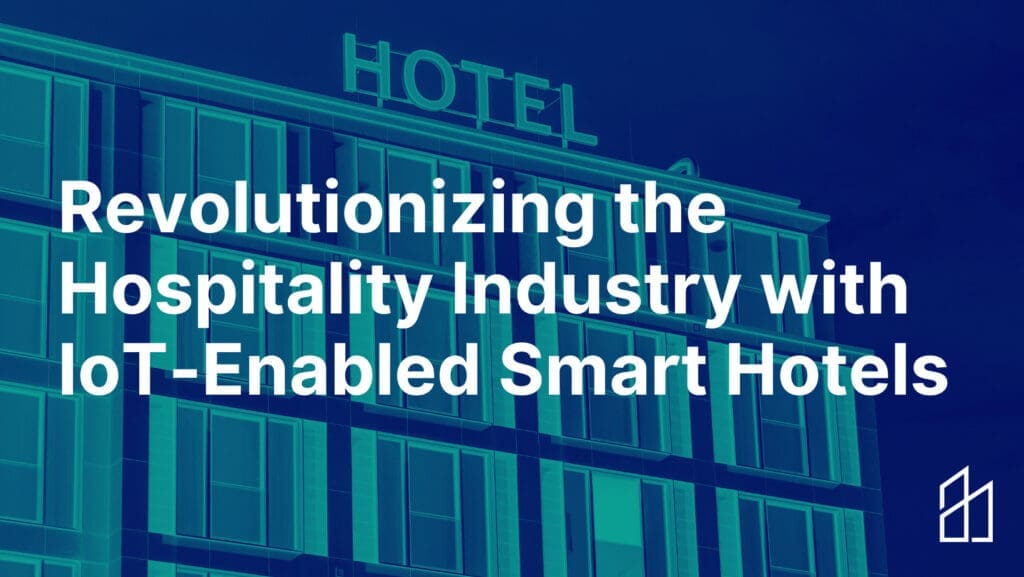
In the rapidly evolving landscape of the Internet of Things (IoT), where experts continually pioneer innovative solutions for smart buildings, the applications span across various sectors. As the installation and operation of IoT technology becomes increasingly cost-effective and convenient, smart buildings are poised to become the new standard.
Numerous industries, including healthcare, real estate, education, and retail, have already embraced IoT solutions, seamlessly integrating them into smart buildings. The hospitality sector, too, holds immense potential for IoT innovation. The concept of smart hotels is gaining momentum, with IoT solutions offering substantial advantages to both hotel operators and guests. However, before delving into the IoT applications within the hotel industry, it’s essential to grasp the fundamental concepts of IoT technology.
Understanding IoT:
IoT stands for the Internet of Things Though the term “things” might seem vague, it encompasses any internet-connected device designed for process control, data collection, or communication with other devices. Examples of IoT devices range from everyday consumer gadgets like Amazon Alexa or Google Home to advanced IoT-enabled smart lighting systems in automated office spaces. Regardless of the industry, IoT-equipped smart buildings are renowned for delivering enhanced efficiency, personalization, and comfort to occupants and visitors.
The Concept of Smart Hotels:
In a smart hotel, IoT-connected devices are leveraged to enhance the guest experience and streamline hotel management processes for staff and administrators. The hospitality industry offers numerous opportunities to implement automation solutions for the improvement of smart hotel rooms. This translates into added convenience and comfort for guests while hotel owners and operators benefit from heightened efficiency, cost savings, and enhanced guest satisfaction.
Exploring Smart Room Technology:
The primary objective of an IoT-equipped hotel room is to empower guests with greater control over their environment. When guests stay in a smart room, they gain convenient options for managing and automating various aspects, such as lighting, thermostats, door locks, and more. Smart hotel rooms with IoT connectivity are becoming increasingly prevalent worldwide, with innovators continuously enhancing IoT technology in the hospitality sector.
Key Benefits of Smart Hotel Rooms:
- Enhanced Guest Comfort: Smart hotel rooms significantly improve guest comfort and convenience. IoT applications, tailored for hotels, include features like smartphone-controlled smart lighting and programmable smart thermostats, allowing guests to optimize their room’s ambiance.
- Enhanced Safety and Security: IoT-enabled smart door locks enhance security by replacing traditional keys with secure smartphone apps. Moreover, IoT security solutions extend beyond guest rooms, providing comprehensive building protection through customized protocols and device coordination.
- Streamlined Maintenance: IoT-equipped hotel rooms provide real-time data on individual rooms, including occupancy status, lighting and energy consumption, plumbing, and water usage. This data aids hotel maintenance staff in optimizing operations, such as room cleaning and maintenance needs.
- Sustainability Solutions: IoT sensors play a pivotal role in promoting sustainability within smart hotels. When an occupancy sensor detects a vacant room, IoT devices automatically make energy-efficient adjustments, such as lighting control and temperature regulation. Additionally, plumbing sensors swiftly detect and report leaks, minimizing repair costs.
Evaluating IoT Risks in the Hotel Industry:
While IoT offers numerous advantages for smart hotels, it also presents certain risks, especially concerning cybersecurity. Ensuring the proper security of IoT ecosystems is crucial to safeguard against potential security breaches and hacking incidents. Robust internet security protocols are essential to mitigate these risks.
Mitigating Risks with PoE Solutions:
One effective approach to enhancing IoT security in the hotel industry is the utilization of Power over Ethernet (PoE) technology. PoE devices rely on wired connections, making it easier to maintain network privacy and security compared to wireless networks, which are more susceptible to unauthorized access. Solutions like Inspextor by MHT offer a safer PoE system with regular updates to maintain security and minimize risks.
Common Technologies in the Hospitality Industry:
- Automated Check-In: Many smart hotels employ IoT-enabled self-service kiosks to automate guest check-in processes, offering a hassle-free experience similar to airport kiosks.
- Asset Tracking: Asset tracking technology in smart hotels allows staff to monitor equipment like luggage racks and cleaning carts in real-time, optimizing housekeeping operations.
- Smart Room Customizations: IoT-connected hotels offer various smart room customization options, including lighting control, temperature regulation, water temperature adjustments, automated window treatments, smart TVs, digitized room service menus, and mobile-controlled smart locks.
- Key Card Integrations: Modern connected hotels are adopting advanced key card options such as room key apps and mobile keys, enhancing guest convenience and security.
- Enhanced Event Rooms: IoT solutions streamline hotel conference rooms and event spaces with customizable lighting, automated temperature controls, and scheduling systems.
- Mobile Phone and Tablet Integration: Guests can use smartphones to access a range of services, from room service requests to room control, providing convenience and efficient communication.
Future Digital Technologies for Hospitality:
The hospitality industry is set to witness the emergence of numerous IoT trends in the years to come, further elevating technology in this sector. IoT is rapidly expanding, and the pace of innovation offers significant opportunities for smart hotel solutions. Smart hotels are poised to become the industry standard, driven by a commitment to offering the best in guest services and modern amenities.
To ensure seamless integration and avoid the fragmentation of IoT systems, it is crucial to have a unified solution that can bring all IoT devices and applications together. Inspextor offers such a solution, allowing centralized control of lighting, HVAC, shades, sensors, and more, simplifying smart hotel management.
To learn more about smart hotel solutions or implementing IoT technology into your managed or owned buildings, contact MHT Technologies today

